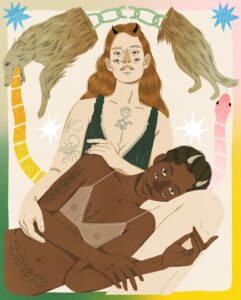Ghost in a Black Girl’s Throat, the stunning debut poetry collection by Khalisa Rae, captures the trauma and triumph of Black queer identities. We spoke to Khalisa Rae about her ground breaking book, disparities within publishing, and spirituality as resistance.
How does Ghost in a Black Girl’s Throat explore the complexities of queer identity and belonging?
Southern religious tradition often paints the Black person as one-note, void of desire, needs, wants. Somehow, we are not allowed to crave, and when we do, we are closer to our demise. In the book, I try to paint Black folks as multi-dimensional, complex creatures that want everything. I give them permission to roam in all terrains of pleasure, without limitation.
In the same respect, Southern religious tradition often doesn’t allow for both things to be true at the same time. I think about “Mackerel”- a true story about me basically being exorcised because my mother caught me coming into my sexuality with another girl. Instead of a conversation, I was shamed with Bible verses and prayer. That creates a narrative that somehow spirituality is the opposite of desire, specifically queer desire.
Ghost challenges the taboo nature of being queer and Black.
KHALISA RAE
In the Black home, it is often taboo to discuss sexuality and identity. Can a woman be spiritual and be queer? Absolutely. They go hand in hand. In Ghost, Black women are held to these impossible standards. We are seen as unbreakable boulders, unshattered, unflawed, which can make expressing one’s true identity impossible. I think about “Circus Acts” and how vulnerability is often not an option for Black women in the way it is for our white counterparts. We are made to chose which part of ourselves is more important, which part of ourselves do we show. Ghost identifies that as another ghost creator. More spirits caught in our throat that can’t rest. In Ghost the poems that are about joy [are] actually the poems about pleasure and queerness. That is purposeful.
In what ways can spirituality be channeled as resistance? How does Ghost in a Black Girl’s Throat reclaim these acts as queer?
Whether it be church, faith, meditation, yoga, reiki, for me, spirituality is resistance because once we are in tune with ourselves, at peace, calm, centered, we are mentally fortified and oppressors hate that. We can’t fight battles when we are traumatized, mentally shattered, operating from a place of fear, feeling defeated. When I want to feel strong, I say Bible verses, when I am at my weakest, I whisper scripture. Our Black bodies need to be refueled, need to be in tune with something greater, regardless of our beliefs or practice. I believe being connected to something bigger is the highest form of resistance because we know its not just us fighting the battle, but also, it allows for us to healing and healing is the greatest weapon.
If I am mentally clear and of sound mind, I can fight white supremacy, oppression, and racism in new ways.
KHALISA RAE
In many ways, the Black queer woman is the leader of the revolution. The Combahee River says if we solve the problems of the Black queer woman, then every other problem with humanity will be solved because she is the lowest on the totem pole. Ghost pans to that point and sheds light on that mindset. How can we center the peace of Black queer folks and prioritize our needs first?
Why is it important for publishing to go beyond representation when addressing the inequities between marginalized voices and singular narratives?
Representation can no longer be the standard. While inclusion sounds great, the push and mission must be equity. This means, the publishing industry must seek to shift the cultural landscape. The VIDA Count reported that less than 10% of books reviewed were Black women books. Now that numbers are increasing, it cant stop there. Representation is just the first step.
The push for diverse books can often make authors feel tokenized, but we crave stories that capture and reward unique perspectives authentically. Not only do the stories about us need to be complex, but the power we hold needs to expand farther than just being represented here and there.
We need to be in the decision-making positions. Equity includes us assuming editor, director, and manager positions. Internal practices must shift to be equitable and inclusive, and acquisitions must become more stringent.
KHALISA RAE
Additionally and more importantly, the wage disparity must be addressed. This is the most heinous crime because money is power and the disparities affect so many BIPOC writers’ livelihoods. The wage disparities in turn send the message that marginalized narratives are not valued the same as white narratives, which gets internalized by Black writers.
It is important to stop putting singular narratives in the forefront and pivot to centering and prioritizing underrepresented narratives.
What are some ways to actively combat systems and practices that fail marginalized identities in literature and publishing?
Some of the work I started with Carve is crucial to the steps of combating systems that fail us. For the white-centered publications, they should look at their mastheads first and interrogate. I would ask a series of questions. Does your masthead and board include a wide array of nationalities, ethnicities, gender identities, sexual orientations, abilities, etc. ? Then consider the contributors, subscribers, and readers. Then the internal practices, in what way do my internal practices position whiteness as the center? Do my submission guidelines clearly establish an anti-discrimination, anti-racist, anti-voyeurism policy?
Most publications don’t have a protocol for problematic submissions, in addition, they haven’t trained their readers and editors to read multi-cultural submissions. It’s crucial that readers and editors go through diversity training and safe zone training. Do you have an inclusive editorial guidebook? Aesthetically, do the pictures represent the world at large? Have you been intentional, inclusive, and equitable with hiring practices, contests, awards, judges, and submissions?
For BIPOC writers we can actively reject the notion that we don’t measure up and stop supporting publications that don’t put their money where their mouth is. So many use diversity and inclusion as a buzz word. We can support collectives, communities, publications, and editors that amplify marginalized voices.
KHALISA RAE
How did Ghost in a Black Girl’s Throat come to be? When writing this book, what challenges did you overcome?
Ghost was birthed in my MFA program. It was my thesis project with Ada Limon and Claudia Rankine. They edited it and helped me cultivate it. I did my MFA program in the South in a very white affluent town and as inclusive as the program was, it wasn’t very diverse. I had to on several occasions experienced othering, racism in my white peer’s poems, and culturally insensitive comments from the admin.
For the book, I thought about the racism I experienced in Wilmington and in my MFA program. So the poems stemmed from the history of violence and trauma that the South carries with it. The poems were inspired by the extreme racism and othering I experienced while living in the South. How I didn’t feel desirable or seen, or heard many times. At the same time, the South was a place of history and I learned so much about my ancestry.
The year I wrote Ghost was so pivotal because I started having childhood trauma triggers, learned that I had a chronic illness, discovered I was queer, and also started getting involved in racial and gender equality. The book encompasses all the many discoveries I was making about myself and my discontentment with the world around me. I had to overcome a lot of the ways in which I saw myself and saw my place in the world. I had to give myself permission to speak up and out, and overcome fear and the imposter syndrome I had.
Why is it important for writers and poets to disrupt the canon? Or challenge trends within writing and publishing? How does Ghost in a Black Girl’s Throat challenge these tropes and expectations?
The book actually started with the title “Outside the Canon” which was my thesis dissertation title.
The rejection of the canon is crucial first because it is dominated by straight white males. Over time, readers start to believe that straight white voices are the only voices that matter, or even worse than they are somehow the standard for talent and knowledge. Second, the canon reaches back to a time when very problematic assumptions were made and don’t reflect that state of equality and inclusion we are reaching for. Old, dated texts don’t center folks of color or even acknowledge our presence or worth. Texts like Shakespeare, Dante, Byron, etc often make highly troubling assumptions about gender relations, sexuality, race, and empire— those beliefs and thoughts were hardly even challenged. Even larger, those texts and formal standards, perpetuated systems of white supremacy.
For Black writers rejecting the canon is crucial because standard literary canon is oppressive and limits Black expansion and operates in a way that omits BIPOC narratives or includes cultural appreciation. Black writers can publish work that doesn’t paint us as perfect. That breaks form and rejects the traditional standard notions of English. We can invent our own forms and be in conversation/pay homage to great BIPOC writers that have come before us to keep the Black tradition alive. Instead of continuously uplifting white narratives.
How can underrepresented writers and poets advocate for themselves in publishing?
I think it’s important for Black writers to speak out against injustice and disparities. To ask for the same pay as their white counterparts, if not more. To also advocate for their work to [be] edited by a diverse mix of peers, for their work to not be watered down, or to omit our dialect, slang, or jargon.
Additionally, we should apply for major positions in publishing and investigate and interrogate the leadership when we don’t get positions. More importantly, I think BIPOC queer writers should refuse to support publications that are not actively in support of underrepresented voices. Those that aren’t actively participating in ending racism in publishing should not get our business or our work. We can also start our own publications, collectives, contests, etc. and continuously foster community.
What writing rituals and routines did you implement when crafting Ghost in a Black Girl’s Throat?
I didn’t really use an extensive process. I leaned on therapy, healing, mantras, and meditation. I took time away from my writing to spend time with family and friends, and quiet moments to reflect and process each piece.
Writing about trauma can be taxing emotionally and mentally. Taking breaks is extremely important.
KHALISA RAE
Any other news you’d like to share?
I hope the book creates change and activates a shift. I hope it motivates folks to change mindsets and behaviors. It starts with our everyday interactions and interpersonal relationships. As I look to the future I am excited to continue activism through writing and poetry. Please look for my next collection on identity, sexuality, and coming of age- Unlearning Eden, releasing Jan 2022.
To support Khalisa Rae, make a visit to your local bookstore or to Red Hen Press to purchase Ghost in a Black Girls Throat.
Read a selection of poems from Ghost in a Black Girls Throat on The Hellebore.


